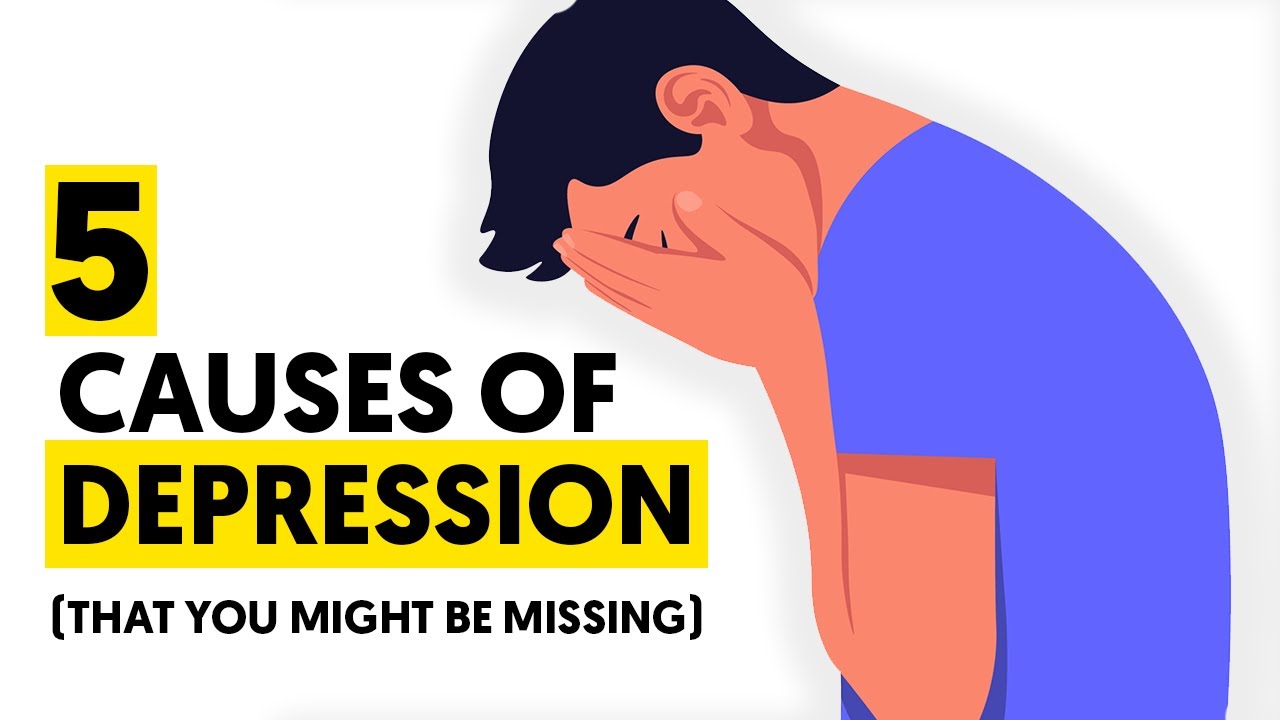5 Causes of Depression That You Might Be Missing
Depression is when you’re just exhausted–mentally, emotionally, and physically–but you still can’t get yourself to sleep.
Sometimes, sleeping too much may indicate depression.
Negative feelings like hopelessness and worthlessness are also common symptoms of this mental condition.
Many of us know the indications of depression, as well as the causes.
Grief, trauma, unemployment, and financial problems are well-known triggers of depression.
However, in some special cases, people are left baffled why they suddenly got depressed.
In this video, we will be talking about the deeper causes of depression that are often overlooked like oxidative damage.
To know more about oxidative damage and the other four uncommon causes, continue watching this video.
Oxidative damage
Oxidative stress is a normal response of the body but may cause damage when it lasts for a long time or happens at higher than normal levels.
When free radicals cause damage to our cells, oxidative damage happens.
While free radicals are a normal part of ageing, too much of them isn’t good.
So does too few antioxidants on our body as this can weaken the natural defences of the body against oxidative stress.
The brain is particularly vulnerable to oxidative damage.
Research has shown a strong relationship between oxidative stress and depression.
Aside from aging; smoking, poor diet, toxins, and excessive alcohol consumption cause more production of free radicals.
Smoking
Smoking has long since been associated with depression.
Nicotine, a major compound in cigarettes, can affect neurotransmitter activity in the brain.
This results in higher levels of dopamine and serotonin.
This could then be the reason why withdrawal causes mood swings and why depression is linked with smoking cessation.
Stay smoke-free and you can balance your brain chemicals.
Thyroid disease
The thyroid is the butterfly-shaped gland in the neck that’s responsible for producing thyroid hormone.
But when the thyroid doesn’t produce enough of this hormone, the body suffers from hypothyroidism–one of the symptoms of depression.
The thyroid hormone has multiple functions, but one of its main jobs is to act as a neurotransmitter and regulate serotonin levels.
Furthermore, based on studies, 25% to 46% of individuals diagnosed with depression or anxiety are due to thyroid dysfunction or other related conditions.
Fortunately, hypothyroidism can be treated with medications.
Nutrient deficiencies
According to experts, a diet that lacks vitamins, essential fatty acids, and minerals increases the risk of anxiety and depression.
These nutrients include omega 3-fatty acids, vitamin D, folate, iron, zinc, magnesium, choline, and copper.
Short term nutrient deficiencies may only result in mild symptoms.
However, when left alone, several and more serious nutritional deficiencies can develop.
Poor sleep habits
It’s no surprise that sleep-deprived people are prone to irritability.
But what many don’t know is that it can also increase the risk of depression.
When you don’t get enough sleep, your brain cells won’t have enough time to replenish and the brain cannot function properly.
These can then lead to depression.
Depression is a sneaky thing.
It can latch on you when you least expect it.
Comment your thoughts or opinions about this video below.
You can also ask us some questions.



![[ID: Hx_A0iLhdr8] Youtube Automatic](https://bizimtube.com/wp-content/uploads/2021/03/id-hxa0ilhdr8-youtube-automatic-236x133.jpg)
![[ID: lp7w0UmpuIs] Youtube Automatic](https://bizimtube.com/wp-content/uploads/2021/03/id-lp7w0umpuis-youtube-automatic-236x133.jpg)
![[ID: s2-7T1TH-lY] Youtube Automatic](https://bizimtube.com/wp-content/uploads/2021/03/id-s2-7t1th-ly-youtube-automatic-236x133.jpg)
![[ID: b_lakC9M4UQ] Youtube Automatic](https://bizimtube.com/wp-content/uploads/2021/03/id-blakc9m4uq-youtube-automatic-236x133.jpg)
![[ID: r44yl6nPONs] Youtube Automatic](https://bizimtube.com/wp-content/uploads/2021/03/id-r44yl6npons-youtube-automatic-236x133.jpg)
![[ID: pAwto1YQjA8] Youtube Automatic](https://bizimtube.com/wp-content/uploads/2021/03/id-pawto1yqja8-youtube-automatic-236x133.jpg)
![[ID: XETG8azHiv4] Youtube Automatic](https://bizimtube.com/wp-content/uploads/2021/03/id-xetg8azhiv4-youtube-automatic-236x133.jpg)
![[ID: f3G_-S_2HUk] Youtube Automatic](https://bizimtube.com/wp-content/uploads/2021/03/id-f3g-s2huk-youtube-automatic-236x133.jpg)
![[ID: G8oWns54snA] Youtube Automatic](https://bizimtube.com/wp-content/uploads/2021/03/id-g8owns54sna-youtube-automatic-236x133.jpg)
![[ID: s0lIFXhu6aw] Youtube Automatic](https://bizimtube.com/wp-content/uploads/2021/03/id-s0lifxhu6aw-youtube-automatic-236x133.jpg)
![[ID: 4UTd2Ev8eYg] Youtube Automatic](https://bizimtube.com/wp-content/uploads/2021/03/id-4utd2ev8eyg-youtube-automatic-236x133.jpg)
![[ID: RKBGBjVJBxQ] Youtube Automatic](https://bizimtube.com/wp-content/uploads/2021/03/id-rkbgbjvjbxq-youtube-automatic-236x133.jpg)